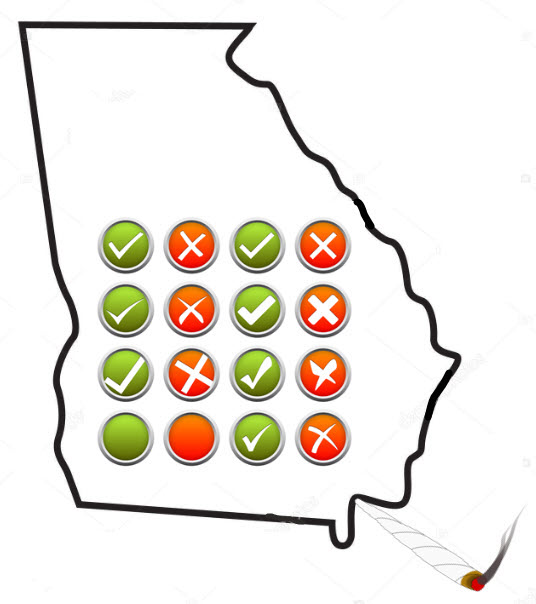
Medical cannabis bill is missing a vote in Georgia Senate, ending MMJ hopes in the state for now
Goodbye to Georgia’s medical cannabis bill – for now.
Last week, the Georgia legislature voted to drop the latest medical cannabis bill after being unable to reach a compromise on proposed repairs. This leaves medicinal cannabis patients with the short end of the stick, as they would not be able to legally purchase their cannabis-derived medicines.
The same bill was introduced and passed in the state House of Representatives a few weeks ago before being sent to the Senate for a final vote. However, the Senate voted 28 to 27 in the Nos, spelling the end of the bill. The bill aimed to fix Georgia’s ineffective medical cannabis program and make medicines more affordable, accessible and trustworthy for the state’s medical cannabis patients.
Georgia’s doomed medical cannabis program
The Georgia state legislature first passed the medical cannabis law, titled Haleigh’s Hope Act, in 2015. The measure was introduced to allow residents suffering from certain medical conditions to purchase and use cannabis oil for relief. Some disorders include muscle spasms, seizures, and pain resulting from end-stage cancer. The approved cannabis products contained up to 5% THC.
The legislature has failed to adequately regulate the manufacture and sale of this product. Therefore, the true purpose of the bill is defeated. The bill only made it legal in theory, but these regulations for the production and sale of cannabis oil would have made it practically possible. The patients were more or less in the same place.
By 2019, legislators approved a much-needed measure to allow legal cultivation and production of medicinal pot, or cannabis oil. The bill also allowed these products to be sold to registered patients. Later that year, Brian Kemp and Geoff Duncan, governor and lieutenant governor, appointed a seven-member committee to oversee regulation of the program. The appointments were tasked with drafting rules and guidelines and licensing growers and producers of medicinal cannabis.
Despite all this, the standstill in the program was still evident and made work difficult. Last year, the state’s cannabis regulatory committee, the Georgia Access to Medical Cannabis Commission (GMCC), announced that it would select six companies from seventy applicants for licensing. This announcement provoked much backlash, and many protests were filed by offended, unsuccessful applicants. Georgia Atlas, one of the applicants, filed a lawsuit, describing the commission’s selection methods as incomplete and lacking in objectivity and transparency.
The various lawsuits led to a complete halt to the licensing process. As a result, over 18,000 licensed medicinal cannabis users have lost access to their medication.
Everyone is disappointed
David Ralston, Speaker of the State House of Representatives, expressed his disappointment with the entire situation. The death of the bill in the Senate is a loss for everyone, especially the patients who cannot buy legal cannabis oil and flower for their treatment.
Ralston explained that lawmakers have been trying to fix the state’s medicinal cannabis program for the past seven years. It is very unfortunate that the Senate failed to find a compromise on this issue. He recalled that both chambers of legislature agreed in March to address the medical program’s problems with two separate bills. Only a miracle can get Georgia’s medicinal cannabis program up and running anytime soon.
A panel of the Legislative Conference drafted the compromise proposal just beaten up. The wording of the bill stated that the state’s cannabis regulator would re-evaluate all protests filed, as well as original applications filed, to select six companies to be impartially awarded operating licenses. If the bill had been approved, at least six medical permits would have been issued by June. The bill included a proposal to allow regulators to issue three additional licenses to medical cannabis producers in the state. In contrast to the Senate, the House of Representatives voted 95 to 73 in favor of the Yay a few weeks ago. Recent events have admitted patients who wish the representatives had all the powers.
MP Ben Watson commented that the turn of events was shameful. He explained that this plan has been in the works for a decade and is constantly being delayed by people who should work to get cannabis oil to children and adults who desperately need it. He added that all children in the state, as well as registered patients, deserve relief – and cannabis oil is the next best thing to give them that relief.
The disappointment that Dale Jackson, a patient caregiver and prospective licensee, felt couldn’t be concealed when he noted that the Georgia government had done nothing to improve or repair the state’s cannabis program. He stressed that the commission had failed hundreds of families in the state. He described the current state of the program as “an abomination”.
What’s next
The next avenue is to work on another separate bill to address these current issues. House Majority Leader Jon Burns announced that the House of Representatives has finally decided on its next course of action. He says the new plan takes into account everyone involved. It was born out of the need for sick residents to have access to the products.
According to Burns, the next step will significantly improve the health of Georgia patients.
The new measure was shelved in the Senate when Gloria Butler, Senate Minority Leader, tabled it. Once a motion to reinstate the ordinance is passed, senators will cast their votes.
bottom line
The deadlock has yet to be broken and there is no specific date for solving the problems the Commission is struggling with.
The House of Representatives played its part. Even Ralston said he hoped the injured families would know that the Senate was to blame. The House of Representatives really worked on the conference committee and did everything they could to get the Senate involved. However, the results were disappointing. The state legislature is back where it started – considering better measures to pull its cannabis program out of the current mess. Cannabis advocates are also calling on legislatures and the commission to be transparent in the licensing process. All companies must be placed on an equal and equal playing field.
GEORGIA AND MEDICAL CANNABIS, READ MORE…

MEDICAL MARIJUANA LICENSES IN GEORGIA EXPAND TO 300!
OR..

GEORGIA GOES DEMOCRATIC, IS NATIONAL CANNABIS LEGALIZATION NEXT?

Post a comment: